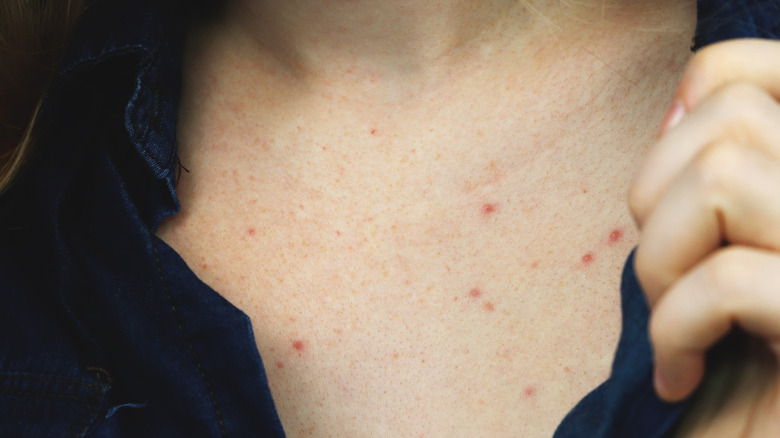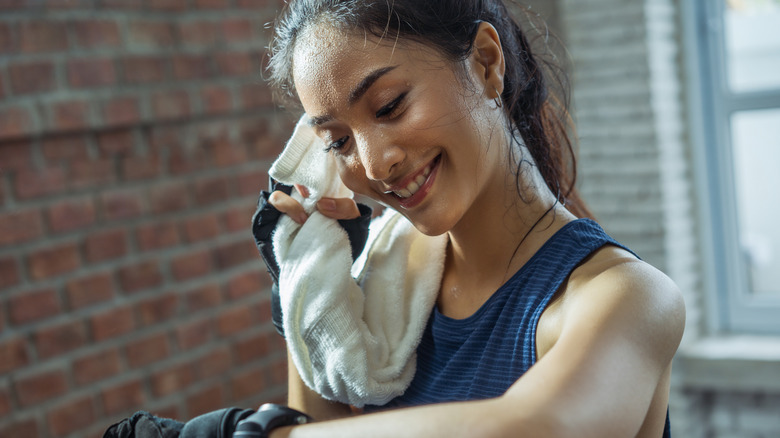What Are Sweat Pimples And How Do You Treat Them?
Drenching in sweat at the end of a heart-pounding workout is no fun, but it serves a purpose. Sweating is healthy because it regulates your core temperature and prevents you from overheating. At the same time, it helps your body eliminate small amounts of arsenic, cadmium, lead, and other heavy metals, according to a 2012 study published in the Journal of Environmental and Public Health.
Unfortunately, this bodily function is also responsible for sweat pimples and may worsen acne. "This type of acne is not going to be the blackhead or whitehead type, which is a different mechanism of action or process, but it's going to be more the pink inflammatory kind," dermatologist Orit Markowitz told Single Care. Sweating opens up your pores, making it easier for bacteria to enter your skin. Open pores can also get clogged with dirt, sebum, or makeup residue, resulting in breakouts.
On the positive side, sweat pimples are easier to prevent and treat than regular acne. Even little things such as wearing breathable clothing and cleansing your skin can make a big difference.
Sweat pimples require the same treatment as acne
This common skin condition has the same causes as some forms of acne and therefore requires similar treatment. Sweat pimples occur when your pores get clogged with sweat, oil, and debris, which can promote inflammation and bacterial growth. Tight clothing can make things worse, causing friction between your skin and the fabric. As a result, it can lead to acne mechanica, a skin disorder characterized by small bumps, zits, and cysts in the affected areas. Excessive friction from clothing is also one of the reasons you get chest acne.
As far as treatment goes, consider switching to skincare products containing alpha- or beta-hydroxy acids, recommends Single Care. A formula with 2% salicylic acid can be effective, too. Apply these products to acne-prone areas after breaking a sweat. If, say, you normally get sweat pimples on your forehead, use a facial cleanser with one of the above ingredients. Apart from that, exfoliate your skin regularly to prevent clogged pores.
Another option is benzoyl peroxide, a topical medication for mild to moderate acne. "It is both antimicrobial, killing bacteria and other organisms, and an exfoliant, helping to unclog pores and gently debride the surface layer of skin," explained dermatologist Jessica Krant in an interview with Allure. For best results, choose a face wash or cleansing gel with 3% to 5% benzoyl peroxide. Start with a low concentration, especially if you have sensitive skin, and increase it gradually over several weeks.
Prevention is the best defense against acne
While it's true that some people are prone to acne, you can prevent or reduce its symptoms by following a proper skincare routine. For starters, remove your makeup before hitting the gym. If that's not an option, consider using non-comedogenic makeup to prevent your pores from getting clogged. Go one step further and switch to water-based creams or lotions, suggests Single Care. If you decide to skip makeup, wash your face with micellar water before and after exercise.
As a rule of thumb, use a clean towel to wipe off your sweat before leaving the gym. Take a shower as soon as you're done training and wear clean clothes on your way home. This extra step can be time-consuming, but your skin will thank you for it. Speaking of clothes, opt for moisture-wicking garments with a relaxed fit. "Tight clothing occludes the pores, causing irritation, inflammation, and, eventually, acne," dermatologist Elizabeth Tanzi told Bustle. Look for fabrics like spandex, wool, lycra, polypropylene, and nylon.
Last but not least, avoid sharing your gym gloves, wrist wraps, and other accessories that come in direct contact with the skin. This helps reduce the spread of bacteria and other germs responsible for skin diseases. On a similar note, wipe off the gym machines before and after using them. Refrain from touching your skin while working out, and wear a soft, moisture-wicking headband to keep sweat out of your face.

